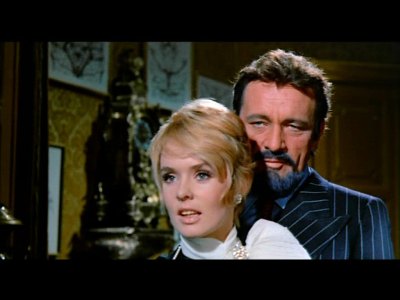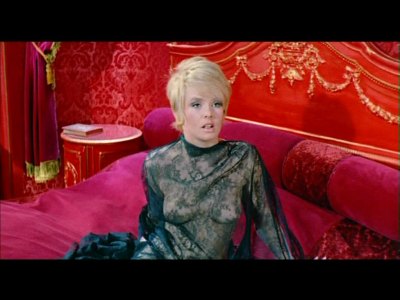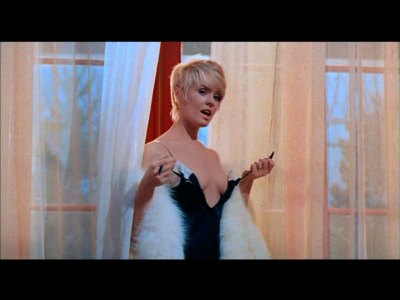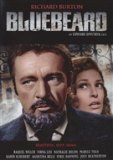| Reviews & Columns |
|
Reviews DVD TV on DVD Blu-ray 4K UHD International DVDs In Theaters Reviews by Studio Video Games Features Collector Series DVDs Easter Egg Database Interviews DVD Talk Radio Feature Articles Columns Anime Talk DVD Savant Horror DVDs The M.O.D. Squad Art House HD Talk Silent DVD
|
DVD Talk Forum |
|
|
| Resources |
|
DVD Price Search Customer Service #'s RCE Info Links |
|
Columns
|
|
|
Bluebeard (1972)
A teen-aged guilty pleasure since first viewed on cable's Showtime back in the late '70s ("You mean, Joey Heatherton is really... naked?"), director Edward Dmytryk's 1972 Euro-trash S&M nudie camp fest Bluebeard, starring the seriously impaired Richard Burton, comes to Studio Canal/Lionsgate in a sub-par, bare-bones, flat letterboxed DVD. A terribly misguided, hesitant film with a few bright moments, for the uninitiated it's a real curio: a fairly big-budgeted, A-list cast multi-international tax write-off, trying to emulate the crap AIP and Hammer were putting out at the same time.

Richard Burton plays European aristocrat and WWI flying ace Baron Kurt von Sepper, who through a horrific plane crash and "some strange chemical reaction," now sports a blue-tinged beard to cover his scars. An avant-garde photographer in his spare time, von Sepper's hobby is killing his numerous wives and photographing them, turning their portraits into Rorschach test-like inkblots - when he's not staring malevolently at a portrait of his dead mother, while playing the organ.
Into his life comes wife number seven, Anne (Joey Heatherton), a vivacious, curvaceous American cabaret dancer who catches the eye of the Baron at one of her performances. Intrigued by his attention (among the flowers she receives at the end of her show is the Baron's coal-black rose), she visits him at his castle, where she matter-of-factly tells him of course she loves him, because he's rich and powerful. They're immediately wed, but on their wedding night, it's suggested that the Baron drugs her champagne, in order to escape sleeping with her. Not even a sexy photo shoot (with Heatherton in her prime) can arouse the Baron, and Anne is left perplexed. Searching the halls for the disappeared Baron, she comes across his servant, Marka the Mute (I'm not making this up), who is grooming the mummified remains of the Baron's beloved mother. Needless to say, Anne suffers a nervous breakdown.
But that's nothing compared to what she discovers when the Baron gives her the keys to the castle in order to explore it, but teasingly demands she not use the small gold key found on the ring. Of course, Anne does, and what she finds terrifies and revolts her (I won't reveal it here but further down below, if you don't want it spoiled for you). The Baron, aware of her "betrayal," sets out to kill Anne, but in a desperate bid to save her life, she implores the Baron to open up about his past killings of his wives, to free his soul - and to buy her precious time before the dawn comes.
SPOILER ALERT!
In an effort to throw everything into the pot, borrowing liberally not only from the obvious One Thousand and One Nights's Shahryar and Scheherazade framework, but also King Henry the VIIIth (whom Burton had just essayed three years prior) and Vincent Price's The Abominable Dr. Phibes from the year before (in interviews, Burton freely admitted he was trying to ape the master, Price), Bluebeard wants to be a chic, deadly, erotic spoof, but it suffers from a screenwriter/director who utterly fails to find a consistent, workable tone.
Actually, it's difficult to ascertain exactly what Edward Dmytryk is responsible for in Bluebeard, because there seems to be some wiggle-room as to who really directed the project. At the end of the opening credits of the film, it states, "An Edward Dmytryk Film," but after the cast listing at the beginning of the end credits, there's a solo credit, given prominence, for Luciano Sacripanti as "Regista," or "Director" in Italian. As well, on the back of the DVD cover, Sacripanti is listed last, as the director of the film, with Dmytryk listed before Sacripanti, with the enigmatic "A Film by Edward Dmytryk." Is this some fancy legal footwork to satisfy a lawsuit? Was one director brought in after another one was let go? I vaguely remember reading Dmytryk's autobiography, but I can't recall any controversy about directing credit on this film. Perhaps this weird co-credit points to the source of the equivocating tone that one finds in Bluebeard.
If you throw the weight of the film's responsibility on Dmytryk (who gets a co-screenwriter credit, as well), it's not surprising that the results are curiously flat for such a potentially ripe subject. By this point in his career, Dmytryk was definitely on the wan (he would direct only three more minor films), still trying to ride the mammoth box office success of his last hit film, The Carpetbaggers, from 1964. Subsequent films after that trash fest were expensive misfires (the western Shalako, starring Sean Connery, the most disappointing), with Bluebeard notorious during its initial release for ticking off most of the critics who bothered to see it. Clearly, Dmytryk's best days were long behind him by Bluebeard's time. How hard could it be to whip up some screen excitement when you have cinema's most notorious rake, Burton, co-starring with several of the most luscious beauties of international cinema - with some of them willing to go topless - enacting scenes of (for then) close-to soft core porn and gratuitous, graphic violence? Doesn't that recipe sound rather foolproof?

Well, unfortunately, it's not here. Burton, somnambulant to the point of catatonic stupor in some scenes, doesn't inspire laughter for his supposedly spoofy, goofy take on the Baron (and certainly not terror, either, as a wife killer), but extreme pity and a macabre fascination in watching what use to be one of cinema's greatest actors fall so precipitously low in his talent and in his choice of projects. After all, Bluebeard was only six years after Burton's triumph in Who's Afraid of Virginia Woolf?; had his career really come to the point where he proudly pointed to imitating Vincent Price (and that's not knocking Price - no one could touch him in this kind of role)? Not content to mine Price's territory, Burton falls back on imitating himself, doing open scene steals from his own films like Who's Afraid of Virginia Woolf? (discussing his mother's "jam" in the same manner as WAOVW? "bergin" story) and The Night of the Iguana (fending off various beauties, Burton reenacts the "walking on broken glass" bit from the Huston film). Frequently looking awful in close-up, his blue eyes (perfectly matched by that silly beard) appear dead as he delivers his terrible lines with barely a modicum of shame (watch him explain the beard, looking everywhere but at his costar). Unhealthily thin, with spindly arms and drawn, narrowed shoulders, one feels immense pity (and eventually a mild disgust) at the sight of this once-giant actor prostituting himself in such garbage.
But then, what did Burton have to work with here? Cobbled together by three screenwriters, Bluebeard thinks it's daring in presenting Burton as an impotent wife killer who keeps the corpses of his unsullied brides frozen in a meat locker down in the castle, but the "shocks" are so matter-of-factly conveyed that the sight of Burton whipping topless dominatrix Marilu Tolo elicits not admiration for pushing the envelope, but apathy at a badly choreographed scene (what, no close-up of the whip biting into flesh?). The flashback murders themselves are equally meek, with special effects (Virna Lisi's beheading) that border on the ridiculous. Dmytryk or Sacripanti (or both) obviously don't have the stomach to give us true exploitation fare, instead hinting at sadism and X-rated thrills while delivering just the kind of elegant, lame film a 12-year-old (in the late 70s) would think is invitingly taboo.
On a positive note (if that's possible), Joey Heatherton walks away with the acting honors in Bluebeard (yep, you read that right). Known for being one of the sultriest sex kittens of the 1960s, who always put out a palpable vibe of wanting to be petted and pawed at, she could be quite a good dramatic actress when given the right material and guidance. Here, she has the benefit of neither of those supports, but still manages to walk away with her dignity intact. That may sound funny, considering she's frequently topless here, but she performs those scenes in a direct, honest manner - as she does with her dialogue scenes with Burton - leaving the viewer with the impression of a pro coming in, doing her job, and getting out. And Ennio Morricone's creepy, lovely theme - no doubt one of his leftover cues that filmmakers used to pick up when they needed "a Morricone" - is certainly a highlight here.
The bevy of Bluebeard's other stars perform in various stages of undress, and to varying degrees of success. Second billed Raquel Welch (maddeningly clothed) as a raunchy nun, is stiff and arch; in other words, another typical Raquel Welch performance. Virna Lisi, horrifically coiffed in a Harpo Marx wig, is grating as a non-stop singing bride. Statuesque, mesmerizing Nathalie Delon is quite funny as the baby-talking model who drives Burton to murder when she demands he choose which of her nipples (she names them, of course) he prefers. Karin Schubert as Greta wraps herself up naked in a sash and has Burton pull her loose like a top (nice). Marilu Tolo looks delicious when whipped into submission. Agostina Belli has a wicked smile when laying naked on a chaise, and Sybil Danning, cursed here with precarious popcorn hair, has her big lesbian seduction scene with Delon cut right when things start getting good.

The DVD:
The Video:
Bluebeard's cinematography by Gabor Pogany is quite evocative at times, but it's not shown to good advantage here in this non-anamorphic, 1.85:1 letterboxed transfer. A grainy, scratchy print was used here; it's apparent that the film would look terrific with some restoration, but sadly, this transfer (with blacks that frequently don't hold and reds that bleed) is sub-par.
The Audio:
The Dolby Digital English audio track is big, fat mono, and is reasonably clear and free of anomalies. Spanish and English subtitles are available.
The Extras:
There are no extras for Bluebeard.
Final Thoughts:
How do you screw up Richard Burton as a sadistic, impotent Nazi killing his wives one by one in erotic, gruesome fashion, with international beauties dropping their tops every ten minutes? Well, signing up past-it director Edward Dmytryk to co-write and direct it (or at least part of it) would be a start. A sad low point in Burton's career. As much as I may have wanted to recommend this cult item, the sub-par transfer really knocks it down a bit. Still; Joey Heatherton in the buff. Try a rental.
Paul Mavis is an internationally published film and television historian, a member of the Online Film Critics Society, and the author of The Espionage Filmography.


|
| Popular Reviews |
| Sponsored Links |
|
|
| Sponsored Links |
|
|
| Release List | Reviews | Shop | Newsletter | Forum | DVD Giveaways | Blu-Ray | Advertise |
|
Copyright 2024 DVDTalk.com All Rights Reserved. Legal Info, Privacy Policy, Terms of Use,
Manage Preferences,
Your Privacy Choices | |||||||













